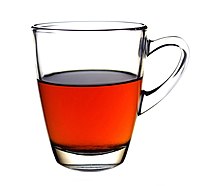
Photo from wikipedia
OBJECTIVES Reports on the association between coffee or tea consumption and subarachnoid hemorrhage (SAH) risk are inconsistent. The aim of this study was to determine if an association exists between… Click to show full abstract
OBJECTIVES Reports on the association between coffee or tea consumption and subarachnoid hemorrhage (SAH) risk are inconsistent. The aim of this study was to determine if an association exists between consumption of coffee or tea and the risk for SAH. METHODS A random-effects model was used to estimate the summary relative risks (RRs) and 95% confidence intervals (CIs). Heterogeneity among studies was assessed using the statistics Cochran's Q and I2. Seven studies on coffee consumption and five on tea consumption were included in the meta-analysis. RESULTS The pooled RRs of SAH for the highest versus the lowest categories of coffee and tea consumption were 1.31 (95% CI, 0.84-2.05) and 0.83 (95% CI, 0.65-1.08), respectively. There was evidence of heterogeneity among studies of coffee consumption (Pheterogeneity = 0.002, I2 = 71.7%) but not among studies of tea consumption (Pheterogeneity = 0.34, I2 = 11.3%). Omitting one study that substantially contributed to the heterogeneity among studies of coffee consumption yielded a pooled RR of 1.51 (95% CI, 1.10-2.06). Dose-response analysis showed that the summary RRs of SAH for an increase of one cup of coffee and tea consumption per day were 1.00 (95% CI, 0.96-1.04) and 0.97 (95% CI, 0.85-1.11), respectively. There was no evidence of publication bias. CONCLUSION Our meta-analysis of current evidence does not support an association between the consumption of coffee or tea and SAH risk. Further studies with prospective designs that control for important confounders and provide sufficient data for dose-response analysis are warranted.
Journal Title: Nutrition
Year Published: 2019
Link to full text (if available)
Share on Social Media: Sign Up to like & get
recommendations!